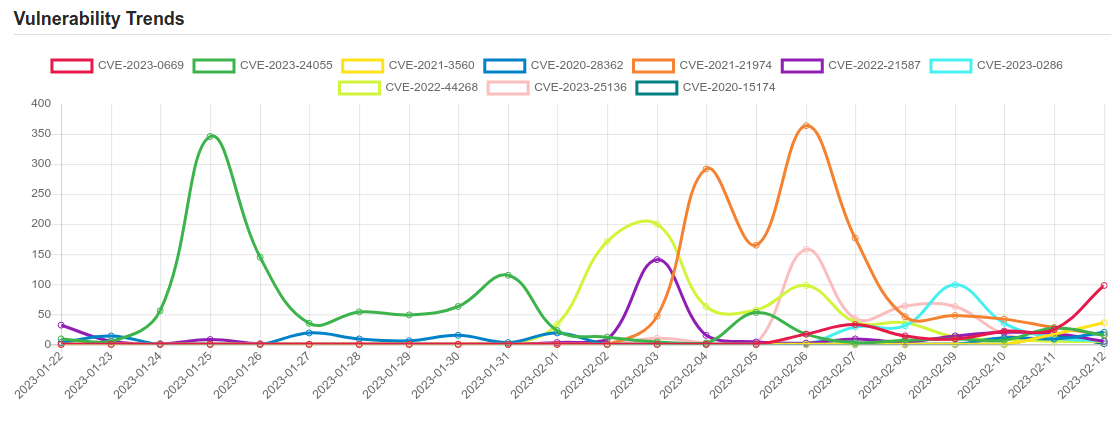Daily Vulnerability Trends: Mon Feb 13 2023

| CVE NAME | CVE Description |
| CVE-2022-23529 | ** REJECT ** DO NOT USE THIS CANDIDATE NUMBER. ConsultIDs: none. Reason: The issue is not a vulnerability. Notes: none. |
| CVE-2022-34689 | Windows CryptoAPI Spoofing Vulnerability. |
| CVE-2023-23286 | Cross Site Scripting (XSS) vulnerability in Provide server 14.4 allows attackers to execute arbitrary code through the server-log via username field from the login form. |
| CVE-2023-0784 | A vulnerability classified as critical has been found in SourceCodester Best Online News Portal 1.0. Affected is an unknown function of the component Login Page. The manipulation of the argument username leads to sql injection. It is possible to launch the attack remotely. The exploit has been disclosed to the public and may be used. The identifier of this vulnerability is VDB-220644. |
| CVE-2023-0785 | A vulnerability classified as problematic was found in SourceCodester Best Online News Portal 1.0. Affected by this vulnerability is an unknown functionality of the file check_availability.php. The manipulation of the argument username leads to exposure of sensitive information through data queries. The attack can be launched remotely. The exploit has been disclosed to the public and may be used. The identifier VDB-220645 was assigned to this vulnerability. |
| CVE-2023-25194 | A possible security vulnerability has been identified in Apache Kafka Connect. This requires access to a Kafka Connect worker, and the ability to create/modify connectors on it with an arbitrary Kafka client SASL JAAS config and a SASL-based security protocol, which has been possible on Kafka Connect clusters since Apache Kafka 2.3.0. When configuring the connector via the Kafka Connect REST API, an authenticated operator can set the `sasl.jaas.config` property for any of the connector’s Kafka clients to “com.sun.security.auth.module.JndiLoginModule”, which can be done via the `producer.override.sasl.jaas.config`, `consumer.override.sasl.jaas.config`, or `admin.override.sasl.jaas.config` properties. This will allow the server to connect to the attacker’s LDAP server and deserialize the LDAP response, which the attacker can use to execute java deserialization gadget chains on the Kafka connect server. Attacker can cause unrestricted deserialization of untrusted data (or) RCE vulnerability when there are gadgets in the classpath. Since Apache Kafka 3.0.0, users are allowed to specify these properties in connector configurations for Kafka Connect clusters running with out-of-the-box configurations. Before Apache Kafka 3.0.0, users may not specify these properties unless the Kafka Connect cluster has been reconfigured with a connector client override policy that permits them. Since Apache Kafka 3.4.0, we have added a system property (“-Dorg.apache.kafka.disallowed.login.modules”) to disable the problematic login modules usage in SASL JAAS configuration. Also by default “com.sun.security.auth.module.JndiLoginModule” is disabled in Apache Kafka 3.4.0. We advise the Kafka Connect users to validate connector configurations and only allow trusted JNDI configurations. Also examine connector dependencies for vulnerable versions and either upgrade their connectors, upgrading that specific dependency, or removing the connectors as options for remediation. Finally, in addition to leveraging the “org.apache.kafka.disallowed.login.modules” system property, Kafka Connect users can also implement their own connector client config override policy, which can be used to control which Kafka client properties can be overridden directly in a connector config and which cannot. |
| CVE-2023-0127 | A command injection vulnerability in the firmware_update command, in the device’s restricted telnet interface, allows an authenticated attacker to execute arbitrary commands as root. |
| CVE-2022-47986 | No description provided |
| CVE-2022-23935 | lib/Image/ExifTool.pm in ExifTool before 12.38 mishandles a $file =~ /\|$/ check, leading to command injection. |
| CVE-2023-0669 | Fortra (formerly, HelpSystems) GoAnywhere MFT suffers from a pre-authentication command injection vulnerability in the License Response Servlet due to deserializing an arbitrary attacker-controlled object. This issue was patched in version 7.1.2. |
| CVE-2023-24055 | ** DISPUTED ** KeePass through 2.53 (in a default installation) allows an attacker, who has write access to the XML configuration file, to obtain the cleartext passwords by adding an export trigger. NOTE: the vendor’s position is that the password database is not intended to be secure against an attacker who has that level of access to the local PC. |
| CVE-2021-3560 | It was found that polkit could be tricked into bypassing the credential checks for D-Bus requests, elevating the privileges of the requestor to the root user. This flaw could be used by an unprivileged local attacker to, for example, create a new local administrator. The highest threat from this vulnerability is to data confidentiality and integrity as well as system availability. |
| CVE-2020-28362 | Go before 1.14.12 and 1.15.x before 1.15.4 allows Denial of Service. |
| CVE-2021-21974 | OpenSLP as used in ESXi (7.0 before ESXi70U1c-17325551, 6.7 before ESXi670-202102401-SG, 6.5 before ESXi650-202102101-SG) has a heap-overflow vulnerability. A malicious actor residing within the same network segment as ESXi who has access to port 427 may be able to trigger the heap-overflow issue in OpenSLP service resulting in remote code execution. |
| CVE-2022-21587 | Vulnerability in the Oracle Web Applications Desktop Integrator product of Oracle E-Business Suite (component: Upload). Supported versions that are affected are 12.2.3-12.2.11. Easily exploitable vulnerability allows unauthenticated attacker with network access via HTTP to compromise Oracle Web Applications Desktop Integrator. Successful attacks of this vulnerability can result in takeover of Oracle Web Applications Desktop Integrator. CVSS 3.1 Base Score 9.8 (Confidentiality, Integrity and Availability impacts). CVSS Vector: (CVSS:3.1/AV:N/AC:L/PR:N/UI:N/S:U/C:H/I:H/A:H). |
A considerable amount of time and effort goes into maintaining this website, creating backend automation and creating new features and content for you to make actionable intelligence decisions. Everyone that supports the site helps enable new functionality.
If you like the site, please support us on Patreon using the button below

To keep up to date follow us on the below channels.






